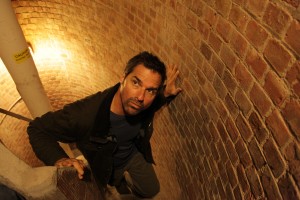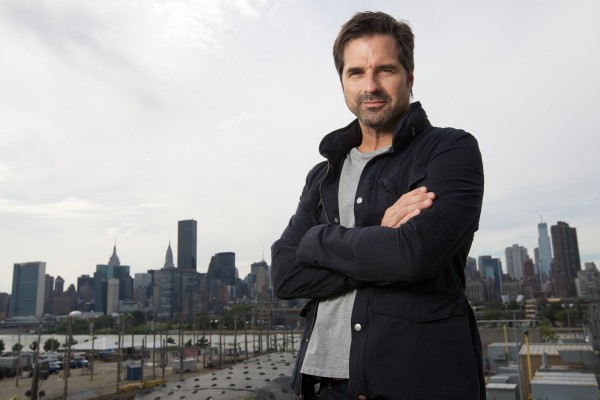PART I: Travel Channel’s Don Wildman talks museums, mysteries, multitasking

Don Wildman knows how to live up to his last name. The “everyman expert” not only enjoys traveling around the world, scoping out mysterious stories and historical artifacts, but he also brings along a camera. His fascination with all things cultural and bizarre makes for invigorating television, which is probably the reason he has not one but two reality series on the Travel Channel.
Mysteries at the Museum dives deep into America’s archives, inspecting forgotten artifacts with engaging background stories. It’s a new way at looking at old places. Off Limits takes an inquisitive look at all things hidden and unseen across the United States, places and people who normally evade the scrutiny of a TV camera. From the hallways of a regional museum to the rafters of a new football stadium, Wildman can travel miles within the span of one hour and the confines of our living rooms.
Recently, Hollywood Soapbox talked with the TV host about both of his shows. Here’s Part I of that discussion (click here for Part II). Questions and answers have been slightly edited.
Do both shows keep you busy?
Insanely so. I started in October of 2011, and I’m just finishing in July. … One day off a week and the rest of the week I’m traveling. Yes, it taxes the soul, but it’s really rewarding.
This seems like a dream come true for you. Both shows seem to fit your personality and interests.
I’m always amazed that my sort of psychic impulses in life came true. All I ever wanted to do was travel the world. It was the strangest thing. I grew up in a little, tiny town in New Jersey, and my parents were real good about reminding us that there was a world out there.
I have an elder sister who is like 16 years older, so she was in the Peace Corps when I was a little kid, and would send home slideshows of the Mariana Islands in the Pacific. And it just triggered in me, I’m sure, a desire to see what she was seeing and to consider the world my playground.
And so that’s what it’s been, and it continues to be. It’s an amazing thing to be able to say that you found your, what’s the word I’m looking for, not home in life, but my destiny. I really do think I have, which is to travel and tell people about what I see.
For Mysteries at the Museum, how do you find some of these artifacts?
It is a dogged effort made by myself and a lot of good people at Optomen Productions in New York. … They’re just on the phone constantly digging up these artifacts. It’s a really good idea for a show for one thing, just because every museum has not only what they show in their display cases, but also this huge archive of stuff. When you call a museum and say, ‘Hey, we’re looking for these stories.’ They’re always aware of stuff the public doesn’t know about.
The great thing is that each one of those artifacts is a tip of an iceberg. So, there’s a whole bunch of other stories that go along with it. It’s a matter of research and knocking on doors.
There’s a great variety to the artifacts on each episode.
When I was raised, the Whitman chocolate sampler box was the hit of the family (laughs). Giving people the opportunity to have choices comes naturally, I guess. I don’t know.
I think that that is the benefit of the show. It’s also an opportunity, because you get to sort of steer people in a zigzaggy sort of way through an hour. I think that’s really why it appeals to people. It doesn’t sort of settle too long in one zone, and it can easily tease to another whole subject matter, which is lovely.
I think people are watching it because it appeals to everybody. There’s stories about dolls that appeal to children. There’s stories about crime that appeal to your average male audience. There’s stories about industry and so forth. It really lends itself to a wide variety of interests.

For the Museum show, are you traveling to each location?
I make an effort to be involved in terms of meeting the people at the museums, which is something I do in my own life. I’m a museum hound. … That’s what I do when I go to cities. So, it’s been really exciting … to have entry into these places and go and shake the hands of curators. I think curators are the celebrities of the museum world, these people who figure out how to tell stories with objects. So, I get to know those people.
There’s another crew that goes around and shoots the B-roll, which is all the background footage and beauty shots of the artifacts. I’m not there at that time, but I get to know these museums.
My personal goal with this show is to make the museums famous, to make stars of these people who do this for a living. Museums suffer the burden of being potentially passive places. They are hoping that people come to see what’s in these places. So, if we have a mission, it’s to give the audience an active role in going and seeing these places through the television show and getting the chance for these people to talk about what they have. It’s really exciting for me. I feel like it’s a good cause.
Is it a challenge to balance the responsibilities between both shows?
Interestingly, they kind of complement each other for myself. I’m not an expert at anything. I’m an everyman. That’s kind of what they call me in the PR: an everyman expert. That sounds like an official title; all it really means is I don’t really know anything.
So, my job is to be curious and to ask questions of things. And basically that’s what both Mysteries and Off Limits does. It engages my curiosity, which is quite high, I have to say.
When I was a kid, I asked so many questions of my parents, they ended up giving me those ‘Tell Me Why’ books. Remember those things? There were hundreds and hundreds of questions I can answer. I literally remember my mother saying, ‘We can’t do this anymore. Here, read these books.’
For Off Limits, it’s a really adventurous show. You must sometimes see an experience and say, ‘I think that’s off limits for a reason. I’d rather not.’
No, as a matter of fact, the whole point is for me to take the audience to places they would never go. So the more dangerous, the better. The more forbidding is always better television. We’re not going to literally kill ourselves, because that would be really messy. And as a result, we’re pretty careful with the spaces we go into and how we go into them. But, the more cramped it is, the better the shot.
By John Soltes / Publisher / John@HollywoodSoapbox.com

